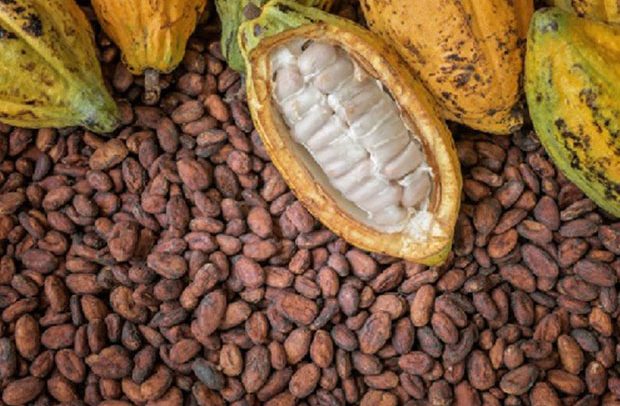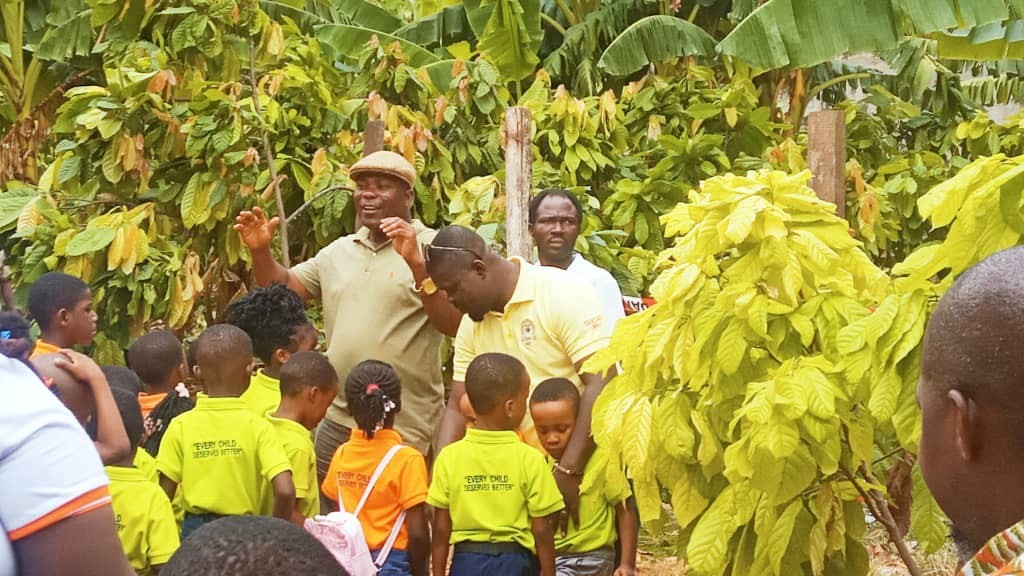
It is midday in Barekese, a farming community in Ghana’s Ashanti Region, about 300km from the capital, Accra.
As the sun beats down, Philip Anane, 50, walks through his cocoa farm, stepping on dried brown leaves scattered beneath the trees. His crops look pale, malnourished, and infected.
“I farm because it’s what I know—what we grew up doing,” he says, inspecting the leaves. “I’ve invested all my money in this farm, but I’ve never gained. At the end of every season, the money I make is less than what I put in.”
Anane pauses to point towards another part of the farm. “I’ve been a cocoa farmer for almost 20 years, but there’s nothing to show for it. I have a family; I want a better life for my children. Now I’m thinking of selling this farm to private investors and using the money to start something else,” he adds, gesturing angrily towards a nearby half-acre plot that has been converted into a poultry farm.
Across the humid forest in Adankwame, another farming community in the Ashanti Region, Holiata Ibrahim tends her cocoa crops. She inherited her cocoa farming knowledge from her grandmother at a young age, but the income from cocoa barely sustains her family.
“Farming cocoa is exhausting,” Holiata says. “It requires a lot of manpower, effort, and money. It takes five years for a tree to grow and start producing, and even then, the earnings are small. It feels like we farmers are working for others to benefit.”
Ghana has farmed cocoa for over 100 years. The country is the world’s second-largest producer, behind Côte d’Ivoire. The cocoa industry employs over a million people and contributes about $2 billion in foreign exchange annually. In recent times, prices of the commodity have increased exponentially, pushed by extreme climate events and supply chain crisis on fertilizers used by farmers.
Yet farmers like Anane and Holiata say they see little of this wealth. They point to the low prices set by the Ghana Cocoa Board (COCOBOD), established in 1947. The board sets cocoa prices to regulate the industry and protect farmers from exploitation by European merchants, but farmers argue that these prices fail to reflect the crop’s true value on international markets.
According to Oxfam, up to 90% of Ghanaian cocoa farmers do not earn a living income. Many of the 800,000 smallholder farmers who cultivate the crop survive on less than $2 a day, struggling to afford basic needs such as food, clothing, housing, and healthcare.
The cocoa industry faces four major challenges: farmers’ livelihoods, human and labour rights, environmental sustainability, and transparency. Despite its global importance, the sector remains beset by inequities that leave its farmers behind.
The Controlled Market and Farmer Struggles
Under Ghanaian law, selling cocoa to anyone other than the Ghana Cocoa Board (COCOBOD) through its licensed buying companies (LBCs) is a crime. The market is tightly regulated, with prices set annually by the government through the Producer Price Review Committee (PPRC).
Farmers cultivate their cocoa and sell it to LBCs, which act as intermediaries for COCOBOD and the international market. This system leaves farmers with no say over pricing or buyers, forcing them to follow rules set by the cocoa board.
According to experts like Nana Kwasi Barning Ackah, Programme Officer at SEND Ghana and Coordinator of the Ghana Civil-Society Cocoa Platform (GCCP), this controlled system is a major reason farmers remain in poverty.
“Once you invest in a business, you expect to profit,” Ackah explains. “Farmers spend on inputs and farm management, but the prices they receive for their cocoa beans often don’t cover production costs. Only a small number of farmers make substantial profits, while most struggle to break even.”
Cocoa prices on the global market are determined by supply and demand. Ghana’s forward sales strategy, designed to protect farmers from price drops, also limits their ability to benefit when market prices rise.
For the 2024/2025 season, COCOBOD set the producer price at GH¢48,000 per tonne or GH¢3,000 per 64kg bag, raising it by just GH¢100 (less than $7) in November ahead of the election. This price is still low compared to the world market price, which surpassed $12,000 per tonne in December 2024, and the farm gate price has been steadily rising over the last decade.
“The increment is not enough to lift most cocoa farmers out of poverty,” says Peter Dadzie, Executive Director of the Akurase Mpuntuo Foundation, a local advocacy group working with cocoa farmers. “When we engage with farmers, their overwhelming concern is inadequate compensation. For most, the payment is insufficient to reinvest in their farms, turn a profit, or support their families.”
A recent study by the Imani Center for Policy & Education a thinktank organization, which surveyed 353 cocoa farmers in three major cocoa-growing regions, found that farmers earn an average of $0.60 per person per day based on a five-person household. This is far below the Living Income Community of Practice (LICOP) standard of $1.96 per person per day and the World Bank’s extreme poverty line of $2.15 per person per day.
Farmers like Emmanuel Ankoma, who has worked on cocoa farms since childhood and now owns 30 acres, believe the controlled pricing system stifles their potential earnings.
“I wish I could sell my produce to whomever I want,” Ankoma says. “The controlled pricing doesn’t help us. When you subtract the money we invest, the profit is very small.”
The 2023/2024 season brought additional hardship with an outbreak of cacao swollen shoot disease (CSSD), which affected 500,000 hectares—25.7% of Ghana’s 1.94 million hectares of cocoa-growing land. CSSD is a major economic threat, causing 15–50% of harvest losses annually.
Since 1946, over 200 million infected cocoa trees have been cut down, yet the disease remains prevalent, with an estimated infection rate of over 30%. Combined with economic difficulties, these challenges make it harder for farmers to survive despite producing one of the world’s most valuable crops, says the Ghana National Cocoa Farmers Association (GNACOFA).
“Cocoa farmers are not treated well at all,” laments Stephenson Anane Boateng, president of GNACOFA. “Imagine running a private business without external support, only for the government to make all the decisions on your behalf.”
Boateng warns that cocoa farming may keep declining. “Production keeps decreasing. Farmers are not treated fairly, and we face unstable weather caused by climate change, persistent diseases, and a lack of support from the authorities.”
The Value Chain
Ghanaian farmers are unable to make significant earnings from their cocoa because they are positioned at the end of the value chain. In the cocoa industry, the most profit is made from the final product. Over 80% of Ghana’s cocoa is shipped abroad in raw form, meaning value is added in other markets. While some international and local companies process cocoa beans into semi-finished or finished goods, this accounts for less than 20% of the total production.
The cocoa value chain in Ghana begins with smallholder farmers who grow and harvest cocoa beans. These beans are then sold to licensed buying companies (LBCs) that store and quality-check them before delivering them to the state-controlled Ghana Cocoa Board (COCOBOD).
COCOBOD regulates prices and oversees the marketing of cocoa beans, either for domestic processing or export to international markets.
COCOBOD plays a significant role in regulating prices and managing cocoa marketing. Many experts believe that to make cocoa farming more profitable for farmers, COCOBOD must shift from its traditional roles and take a more active part in processing raw materials into finished goods.
“In any business, adding value is key to maximizing returns. Therefore, it’s imperative for Ghana and COCOBOD to consider processing cocoa beans domestically, rather than merely exporting raw materials. By processing our raw materials, we can gain greater financial value,” suggested Nana Kwasi Barning Ackah, Coordinator of the Ghana Civil-Society Cocoa Platform (GCCP).
However, this shift is challenging because COCOBOD is a political institution managed by political appointees of the ruling government. Leadership changes with every change in government, often bringing new directives and policies.
“COCOBOD has been reduced to a cash cow, exploited by politicians for personal gain with minimal accountability,” observed Peter Dadzie of the Akurase Mpuntuo Foundation. “To ensure farmers reap the rewards of their labor, COCOBOD’s operations must be shielded from political interference. We need technocrats and experts to manage the board, guaranteeing farmers receive fair prices and quality services.”
Corruption is another significant concern. Although COCOBOD has denied allegations of corruption, there have been instances where staff involved in financial mismanagement were dismissed. A former chairman of the board is currently in a legal battle with the government over alleged financial improprieties.
COCOBOD’s financial struggles compound these challenges. For decades, the organization has relied on external loans to purchase cocoa beans from farmers. However, it failed to secure a loan for the 2024/2025 season because international financial institutions lost confidence in its management. According to cocoa marketing expert Shuaibu Abubakar, this lack of financial stability could have been avoided.
“I’m baffled that after years of operation, COCOBOD still needs to take out loans to buy beans from farmers,” noted Shuaibu. “Why couldn’t they have saved over the years to make these purchases? Loans come with conditions and interest, which eat into their profits. If COCOBOD used its own funds, it would increase its earnings, ultimately benefiting both the government and farmers.”
Ghana has taken steps to address its struggling cocoa sector. In 2018, Ghana and Côte d’Ivoire, which together account for about 60% of global cocoa production, launched the Côte d’Ivoire-Ghana Cocoa Initiative (CIGCI). The initiative aims to address challenges facing cocoa production and improve farmers’ livelihoods through innovative collaboration.
Additionally, Ghana is working towards implementing the European Union’s Deforestation Regulation (EUDR), which could make cocoa farming more sustainable, fair, and innovative. As part of this effort, COCOBOD is developing a Cocoa Management System (CMS), a national database of cocoa farms and their owners.
The Ghana National Cocoa Farmers Association (GNACOFA) has also introduced initiatives to support farmers. These include low-interest loans and financial services through its Co-Operative Credit Union, sustainable cocoa farming programs through its Agro-Input Field & Factory, and projects focused on health, housing, and community development.
For farmers like Anane and Holiata, cocoa farming is a way of life. Despite the challenges, they are committed to their work but fear their children may not want to continue the trade. This reluctance could lead to the knowledge and traditions of cocoa farming fading away with their generation.
By: Olatunji Olaigbe and Ibrahim Khalilulahi Usman
Muhammed Bello contributed to the field reporting
The post Why are Ghanaian cocoa farmers still poor? first appeared on 3News.
Read Full Story

















Facebook
Twitter
Pinterest
Instagram
Google+
YouTube
LinkedIn
RSS